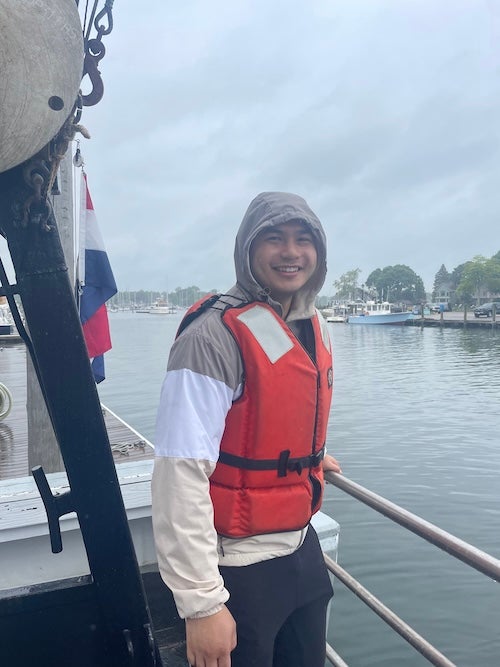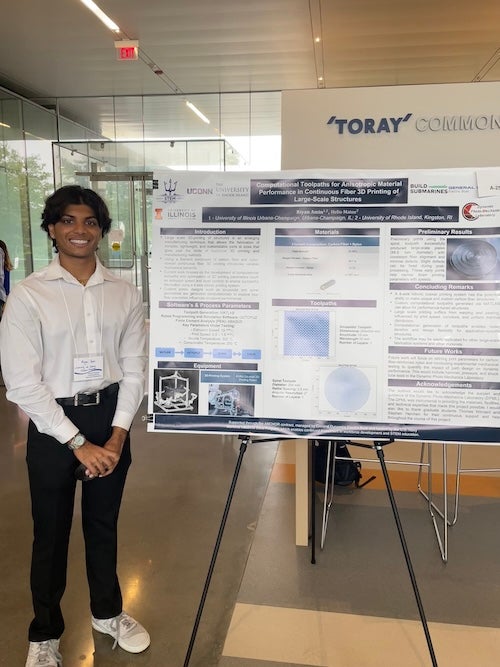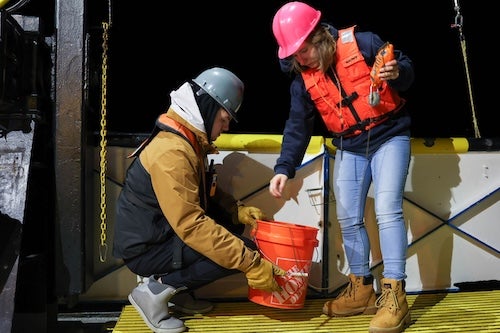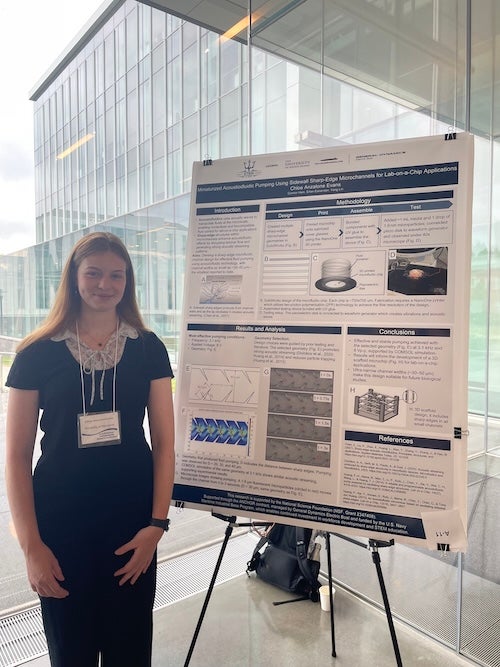URI Navy STEM’s cohort of undergraduate fellows wrapped up their research in July. Read on to learn about the research they completed this summer, their experience in the Advancing Naval Careers Through Higher-ed Outreach and Research (ANCHOR) Fellowship program, and what’s next for them.

Anna Lea Hyer, University of Alaska Fairbanks, Electrical Engineering
This summer, I worked in the ICRobot lab, which is developing a VR-based experimental platform for future physical human-drone interaction studies. My project focused on designing an end effector that delivers real-time wind and audio feedback based on the virtual drone’s position. The goal was to integrate the virtual and physical worlds to create a more immersive user experience. The ANCHOR field trips were both fun and eye-opening, giving me a chance to learn about all things submarine and oceanography. Through ANCHOR, I gained invaluable experiences, from hands-on lab work to engaging with experts in the field. Looking ahead, my immediate academic goal is to complete my electrical engineering degree while continuing to get experience in the field. On the nonacademic side, I am excited to explore a little bit of the East Coast before heading back to Alaska.

Royaljohn Southammavong, University of Rhode Island, Electrical Engineering
I explored real-time simulation applications for power generation equipment for design applications where physical access may be restricted. These simulations update constantly to match the physical system as close as possible so that engineers can test and prototype new control methods or equipment without having to impact vital operation. The ANCHOR field trips were pleasant outings to interesting places where the average person may go their whole lives not witnessing. From boat rides to nuclear reactors, these experiences were a fine addition to a research-filled summer that may stall from time to time. With my experience with power systems, I plan to expand my knowledge of power electronics by attempting a master’s program in electrical engineering.

Rian Amin, University of Illinois, Mechanical Engineering
I worked on 3D printing large-scale carbon fiber structures that could be used in undersea vehicles. Our goal was to test the structures to see how they responded and how customizable we could make them. Being able to see the submarine base and to visit the University of Connecticut to see their research labs as well were great experiences and super applicable to my research. I plan to explore other research areas while I finish my degree and am considering graduate school in the future.

Susanna Majkut, University of Rhode Island, Ocean Engineering
This summer, I worked on a research project with Brennan Phillips to develop software that will be used to display temperature data from deployment of a long-term distributed temperature sensing system, in conjunction with Ocean Networks Canada (ONC). Additionally, I was able to attend a two week research cruise with NOAA’s Ocean Exploration Cooperative Institute (OECI), where we mapped and scanned shipwrecks in Lake Ontario. I was grateful to have the opportunity to tour a real, active, Virginia-class submarine as part of the ANCHOR program. It was incredible to see all parts of the sub, but my favorite part was seeing where their SONAR system operated. I am planning to apply to graduate school, and I hope to work in the fields of sonar systems, distributed sensing (acoustic or other), or other robotics adjacent technology.

Chloe Evans, University of Maryland, Mechanical Engineering
I worked on developing structures that leverage acoustofluidics and sharp edges to pump or mix very small amounts of fluids in, for example, a “lab on a chip.” During my summer here, all the field trips we took were so interesting, on-theme, and well-organized. Transportation was provided for all of us, which was very helpful for me coming from out of state. In the future, I’m considering going into industry when I graduate.

Ethan Marchetti, University of Rhode Island, Mechanical Engineering
My project focuses on how we can prevent underwater biofouling using a magnetic silicone composite. This summer I explored how to test the effectiveness of this material using Staphylococcus epidermidis bacteria. In addition to my research, I also enjoyed seeing the manufacturing processes of a submarine on our field trips. Seeing the engineering that goes into these vast manufacturing processes was a memorable experience and gave me insight into possible career paths after college. After this summer, I’ll be close to finishing my degree in Mechanical Engineering and soon I aim to apply towards a graduate program of study.
